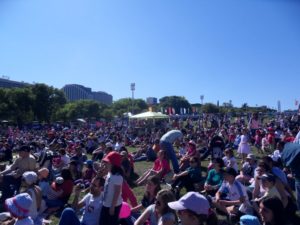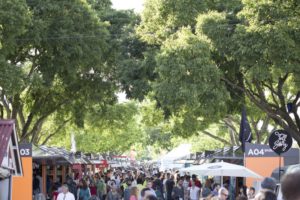A bit of history
Officially, Lisbon Book Fair took place, for the first time, in May 1930, in Rossio Square, for 12 days, with 17 stands. The following year, in 1931, it was organized by the Portugal’s Booksellers Association, later on evolving to the current Portuguese Publishers and Booksellers Association.
The two first editions were a huge success and referred the Lisbon Book Fair as one of the most relevant events in the Portuguese capital city. It has transformed the spring season in a cultural meeting point stimulating the growing participation for publishers and booksellers as well as visitors. The main purpose was, as today, to promote education and knowledge through books and reading.
In 1940, the Lisbon Book Fair moved to one of the most emblematic streets in Lisbon, Avenida da Liberdade, where it remained for decades, with crescent growth.
In 1980, celebrating its 50th anniversary, the Lisbon Book Fair moves to its current location, Parque Eduardo VII, one of the most beautiful open spaces in the city; a privileged green area, with a superb view facing Tagus River.
All APEL´s staff is involved, and several people are hired just for the event. Working directly in (or with) the organization there are 70 people. Considering all the professionals someway involved in the event, it’s fair to say the number surpasses 1000 people.
Lisbon’s municipality has been a long time determinant partner to achieve the positive results that characterize this event. Considering the financial support, logistical backing and the public place concession, the Town Council has maintained a close and privileged relationship with APEL that has been reflecting successful results year after year.
Also, several Ministers of Culture have acknowledged the importance of Lisbon’s Book Fair expressing its support through a protocol that statuses it as an “Event of Cultural Interest”, circumstance that provides the institutional assistance for the creation of other protection solutions for artistic and cultural projects (Law of Patronage).
Lisbon Book Fair has conquered throughout the years an unquestionable space in the Portuguese cultural calendar.

A renovated event to welcome everyone
Iconic in the city’s history, Lisbon Book Fair has been upgrading itself year after year, increasing in participants – publishers, bookshops, cultural activities’ companies, food and beverage companies – and in number of visitors.
The year of 2009 was clearly the fairs turning point, with new, more modern and colorful stands, separating itself from its old, heavy and colorless past. That year was the fair’s first step towards a new layout and a new dynamic, refurbishing itself to please its visitors by offering them more than books.
Year after year, the fair has been growing in a way that, from 2009 to 2016, had expanded its stands reaching 277, and having almost 600 publishers and imprints represented. In 2009, these figures were 219 stands and 370 publishers, representing a growth of 26% and 60%, correspondingly.
Also in the cultural side the Fair has become one of the major events in Portugal. In 2016 a total of 1500 events happened all-over the Fair, a 3x increase from the 550 events that took place in 2012 (first time we start counting them).
These events occur a bit all-around the Fair. APEL provides 6 shared and cost free spaces that can be used by any participant, with previous booking. These spaces are:
- Main Auditorium – a 15x6m indoor and climatized space, with seats for 80 people, video projection and special audio equipment, located on the balcony (that we build) in the top of the Fair;
- Show Cooking Auditorium – a 100m2 open space with seats for 70 people, and a full equipped kitchen;
- 4 Squares – 4 outdoor 5x4m stages, with audio equipment, located in the 4 main squares, with seats for 45 people.
Also, the participants promote events, such as autographs sessions, in their own stands. This year we expect to receive over 1000 authors in the event.

Visitors’ profile, who are they and what they represent
Lisbon Book Fair is an open air event with no entrance fee for the general public.
Today, the fair is seen as more than just an event to buy books, but as a wider cultural event where people want to come back and look forward to every year, and this reflects in its increasing visitor’s numbers. In 2012, when we started to audit Lisbon’s Book Fair, the event had, on average, 22.770 daily visitors, and increased this number to 25.282 in 2016. Globally, the event increased its total visitor numbers from 455.000 to 480.000 people in only 18 days, with a whopping 2014 year when we had 532.000 total visitors in a daily average of 29.534 people.
The fair lasts, usually, for 18 days (never less, sometimes 1 or 2 days extra), and it is mandatory to take into consideration that these numbers are also highly influenced by the weather conditions and the number of public holidays.
Nevertheless, visitor statistics have increased 25% during working days, although weekend days are always the busiest.
The ability of the event of bringing new visitors isn’t very high, although its customer retention is. The Fair’s main challenge is to capture new visitors, increasing every year its customer retention.
Visitors are mainly young people – between 25 and 34 years old – with high education degrees, reason why the internet is taking a bigger role in communicating the cultural agenda.
Since 2009, the Fair has been outside its website, on numerous Social Media platforms, such as Facebook, Instagram and, a 2016 debut, Snapchat. In addition, a 2016 debut is the mobile app, available for Android and iOS where it is possible to see everything that’s happening in real time, each stand’s localization, all of the activities that are happening in each stand, at a precise day and minute.
Since a big percentage of visitors (25% in 2016) make wish lists or shopping lists before going to the fair, the mobile app also allows its users to make these lists according to their preferences.
However, as 59% of the visitors spontaneously buy books outside their lists, it’s still very important to focus in traditional marketing and selling techniques such as HORA H – an happy hour taking place at the fair´s final hour, from Monday to Thursday. During this, event publishers sell their books 50% off (only for the ones who want to participate and with books outside fixed price law). This kind of commercial opportunities gain more importance as we know that, although visitors are more careful about their expenses, the biggest percentage (50% in 2016) don’t make any lists of what they are going to buy at all.
The satisfaction level with the fair, its infrastructures, offers and cultural program is getting higher each year. In the past few years, the satisfaction level towards children activities’ calendar is increasing as it is towards all the food and beverages offers. From a 62% global satisfaction standard in 2012, we’ve grow to a 87% level of visitors that evaluates the event as good or very good, in 2016.
Other important/curious conclusions of 2016 study are:
- 53% of the inquired people said the fair was better than ever;
- 87% recommended the visit to a friend;
- 85% visited the Fair in previous years (high “client” retention);
- Average visiting time is 2h20m (64% stays for 1 to 2 hours, and 28% for 3 to 4 hours);
- 75% doesn’t have a defined budget to spend;
- “Mood” impact: 79% left the Fair “happier” then when arrived.
Read on it… and eat at it
One of Lisbon’s Book Fair challenges has been to create an environment where people feel welcome and want to spend their time. In the past few years, the average time spent in fair per visitor had been increasing, reaching now a total of two hours.
So, in addition to buying books, what do people do? They listen to music, read, buy books and eat. This year, Lisbon Book Fair reached a grand 40 food and beverage stands, with a vast offer from bagels to pizzas, from ice creams to waffles. The Book Fair has been increasing its offer and creating dedicated areas for people to eat while reading, to eat alone or to eat with their family and friends. There are also various offers for children.

The Book Fair for children: a place to learn whilst having fun
Children activities have also engaged major attention from the Fair’s organizers. Lisbon’s Municipality Libraries Department (CML-BLX) had been operating as a strong and dedicated APEL’s partner for the past years, promoting children activities in the Fair. Last year, together, we have created the event “Acampar com Histórias” (Camping with Histories) where parents can enroll their children to spend a night in “Estufa Fria” (a municipality greenhouse) with numerous activities to promote the reading culture amongst the new generations.
This year, we’ve repeated the event and all the 160 vacancies where filled in two days!
Lisbon’s Book Fair – A place to be awarded!
As an iconic event around books and publishing, Lisbon’s Book Fair has been chosen by many publishers and associations to host their award ceremonies.
“Prémio Uma Aventura” (An Adventure – a famous children book collection – award that rewards creativity in writing), “Prémio LeYa” (LeYa Award – best author), “Prémio UCCLA” (The Portuguese Capital Cities Community Awards – new talents and new books written in Portuguese) and naturally APEL with its “Prémio Livraria Preferida dos Portugueses” (Portuguese Favorite Bookshop Award) have elected the Fair as the place where they announce and deliver their awards.
In a few words
From a nice stroll at the end of a working day, to a big book shopping excursion, from a well spent afternoon with kids or a place to relax and read your new favorite novel, Lisbon’s Book Fair is an event that brightens the city for three weeks. Increasing its participants, augmenting its visitors and reaching new levels of high standard book offerings, Lisbon’s Book Fair is learning from the past, conquering the present and preparing itself for the future.

















